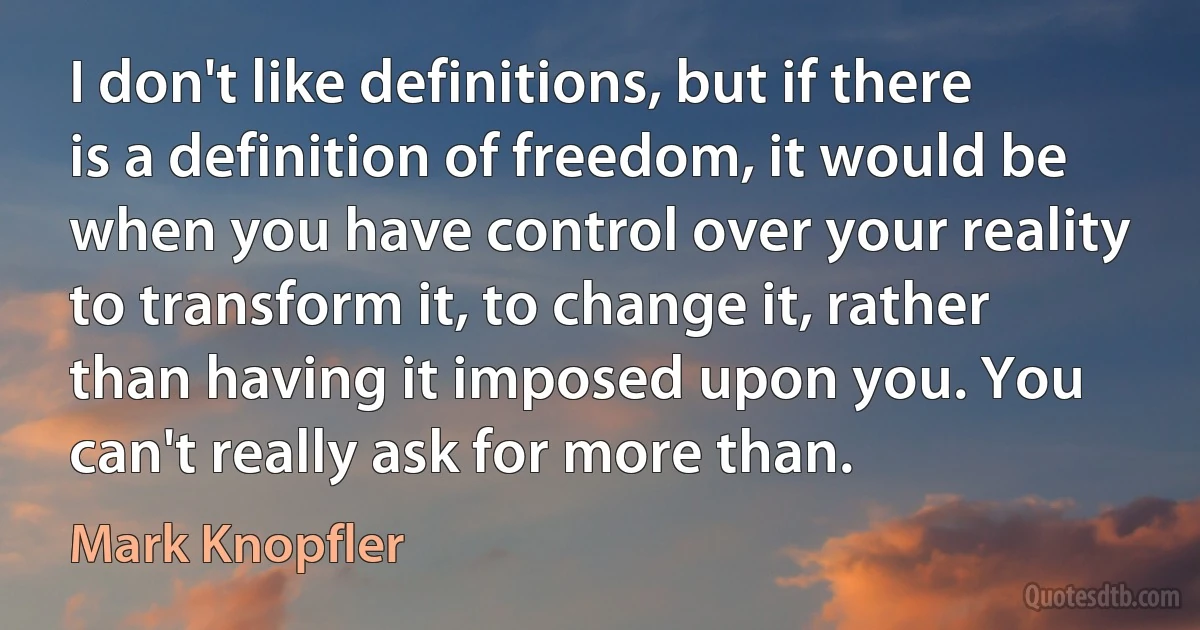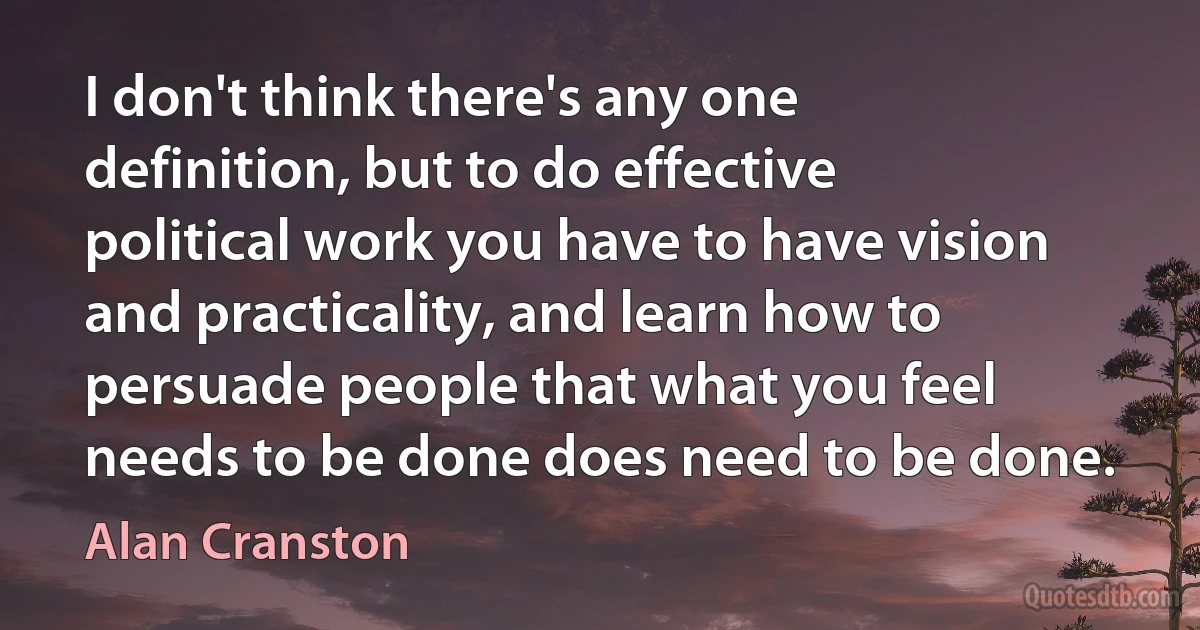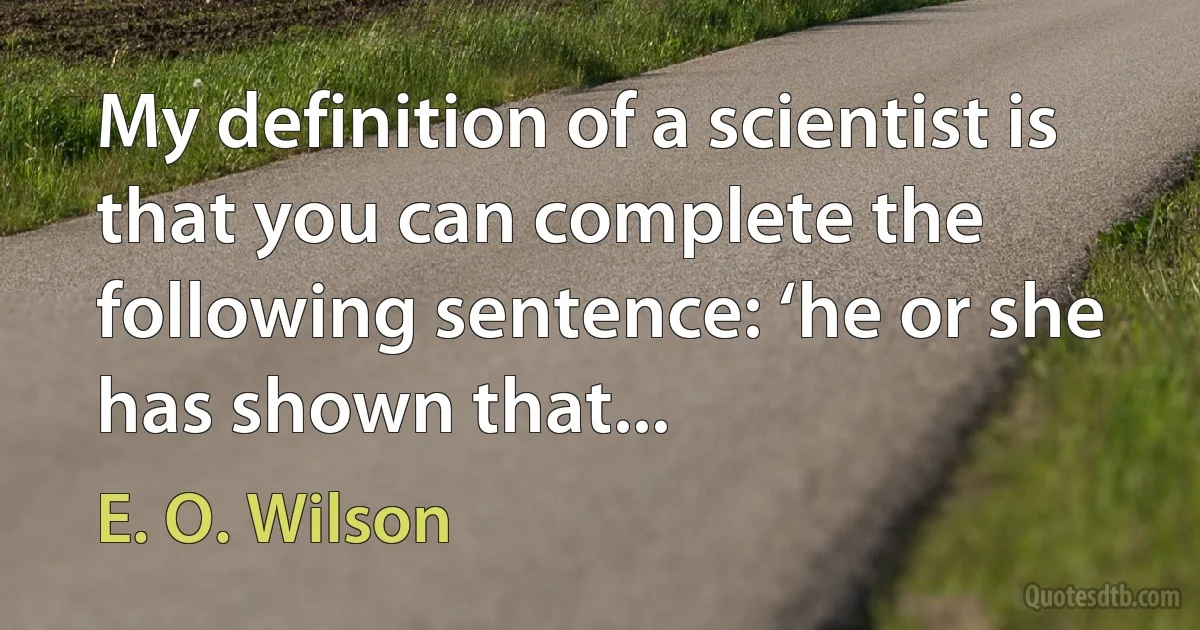Definition Quotes - page 13
Those who are in ideology believe themselves by definition outside ideology: one of the effects of ideology is the practical denegation of the ideological character of ideology by ideology: ideology never says, ‘I am ideological'. It is necessary to be outside ideology, i. e. in scientific knowledge, to be able to say: I am in ideology (a quite exceptional case) or (the general case): I was in ideology. As is well known, the accusation of being in ideology only applies to others, never to oneself (unless one is really a Spinozist or a Marxist, which, in this matter, is to be exactly the same thing). Which amounts to saying that ideology has no outside (for itself), but at the same time that it is nothing but outside.

Louis Althusser
Accordingly, time logically supposes a continuous range of intensity of feeling. It follows then, from the definition of continuity, that when any particular kind of feeling is present, an infinitesimal continuum of all feelings differing infinitesimally from that, is present.

Charles Sanders Peirce
In its most general form and from the point of view of physics, love is the internal, affectively apprehended, aspect of the affinity which links and draws together the elements of the world, centre to centre. This is how it has been understood by the great philosophers from Plato, the poet, to Nicolas of Cusa and other representatives of frigid scholasticism. Once this definition has been accepted, it gives rise to a series of important consequences. Love is power of producing inter-centric relationship. It is present, therefore (at least in a rudimentary state), in all the natural centres, living and pre-living, which make up the world; and it represents, too, the most profound, most direct, and most creative form of inter-action that it is possible to conceive between those centres. Love, in fact, is the expression and the agent of universal synthesis.

Pierre Teilhard de Chardin
Let the orator whom I propose to form, then, be such a one as is characterized by the definition of Marcus Cato, a good man skilled in speaking. But the requisite which Cato has placed first in this definition-that an orator should be a good man-is naturally of more estimation and importance than the other.

Quintilian
This is not to underestimate the historical obstacles to the development of democratic institutions and a democratic culture. Such problems nearly destroyed our country – and that should encourage a spirit of humility and a patience with others. Freedom is not merely a political menu option, or a foreign policy fad; it should be the defining commitment of our country, and the hope of the world. That appeal is proved not just by the content of people's hopes, but a noteworthy hypocrisy: No democracy pretends to be a tyranny. Most tyrannies pretend they are democracies. Democracy remains the definition of political legitimacy. That has not changed, and that will not change.

George W. Bush
The Definition in the Elements, according to Clavius, is this: Magnitudes are said to be in the same Reason [ratio], a first to a second, and a third to a fourth, when the Equimultiples of the first and third according to any Multiplication whatsoever are both together either short of, equal to, or exceed the Equimultiples of the second and fourth, if those be taken, which answer one another.... Such is Euclid's Definition of Proportions; that scare-Crow at which the over modest or slothful Dispositions of Men are generally affrighted: they are modest, who distrust their own Ability, as soon as a Difficulty appears, but they are slothful that will not give some Attention for the learning of Sciences; as if while we are involved in Obscurity we could clear ourselves without Labour. Both of 300 which Sorts of Persons are to be admonished, that the former be not discouraged, nor the latter refuse a little Care and Diligence when a Thing requires some Study.

Isaac Barrow
That the universe, as was once thought, expands and contracts indefinitely, one Big Bang collapsing into another one, seemed reasonable enough. But in both models of the universe, what caused the first Big Bang? Or was there a first Big Bang, any more than a last number? If there was a first cause, was there a first causer? Did Big Bangs just happen to happen? Can we name the first causer "God”? We can name it anything we want. I can name it after myself. It is utterly insignificant what it is called, because we would be giving a name to something that falls outside all categories of thought and must be unknowable and irrelevant to knowledge. So naming it is a futile enterprise. The word "God” is unhelpful because it implies it has a knowable definition.

Roger Ebert
Well, what is a political film? A film about politicians? Or a film about issues - sexism, racism, the environment, nuclear policy? I decided on the broader definition. If I'd limited myself to films about politicians, it would have been a short list: How many characters in any mainstream American movie seem aware of the political process, or belong to a party?

Roger Ebert
Intelligence, then, is the ability to attain goals in the face of obstacles by means of decisions based on rational (truth-obeying) rules. The computer scientists Allen Newell and Herbert Simon fleshed this idea out further by noting that intelligence consists of specifying a goal, assessing the current situation to see how it differs from the goal, and applying a set of operations that reduce the difference. Perhaps reassuringly, by this definition human beings, not just aliens, are intelligent. We have desires, and we pursue them using beliefs, which, when all goes well, are at least approximately or probabilistically true.

Steven Pinker



